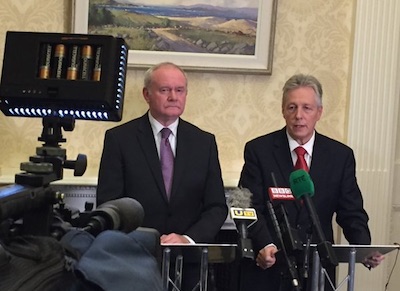
A partial agreement has been unveiled after Sinn Fein, the DUP and the London and Dublin governments brought the latest round of Stormont crisis talks to a conclusion today.
An international body will be set up to monitor IRA and loyalist paramilitary activity, with appointees nominated by the Dublin and London governments and the Six County Executive. It will have an annual budget of 3.2 million pounds.
New principles are to be put in place to ensure politicians work towards the disbandment of IRA and paramilitary structures. Sinn Fein and the DUP signed up to an agreement that ‘politicians must not take instructions from anywhere other than those who have given them their democratic mandate’. The new principles will apply not only to ministers, but to all members of the Stormont Assembly.
Due to a British government insistence on full secrecy on matters of “national security”, there was no agreement on the past or on victims. These ‘legacy’ issues have been deferred to a separate round of talks to begin sometime next year.
Measures previously planned to address the issues of flags and parades, agreed in the 2013 talks under US envoy Richard Haass, are expected to now go ahead.
The deal will also see Stormont Assembly members tomorrow pass an emergency motion giving the British parliament in London the power to implement cuts to the North’s welfare system. The move is intended to ensure responsibility -- and blame -- for such cuts is deflected onto the British government.
However, there will be a series of other financial measures to compensate for the welfare cuts, including spending on roads and other infrastructure.
Institutional changes include the concept of an official opposition at Stormont for the first time.
Sinn Fein’s Martin McGuinness said his party remained determined “to do all in our power to oppose this austerity and protect our people and our public services”.
He said the party’s efforts had helped to secure more than half a billion pounds of additional funding for Stormont with “flexibilities that can be invested in growth and public services”.
“We will continue to do all we can to support those in need,” he said.
“The legacy of the past remains a huge gap in this work,” he added.
“The onus remains on the British government to live up to their responsibilities to victims, in particular full disclosure.
“We also addressed directly the issue of paramilitarism. There can be no place for armed groups in our society. That is why the agreement includes additional resources for policing and mechanisms to challenge armed gangs and criminality.
“Our political institutions are the best way forward. The First Minister and I are absolutely united on this.”
British Prime Minister David Cameron described the agreement as a “breakthrough” and an “important turning point for Northern Ireland”.
“The agreement secures sustainability for Northern Ireland’s budget, sets out how we’ll deal with paramilitary groups, and could provide a basis for a shared future for the people of Northern Ireland,” he said.
“The progress we’ve achieved is testament to the commitment and hard work put in by the Northern Ireland parties, backed by Theresa Villiers and the Irish Government, and I’m very pleased we’re taking this step forwards.
“What is vital now is that the parties in Northern Ireland use this agreement as the platform for stable devolved government that delivers on the day to day issues that matter to people.”
A statement from the Dublin government’s Foreign Affairs Minister Charlie Flanagan described the deal as “another milestone agreement”.
Addressing the lack of agreement on legacy issues, Flanagan said: “Regrettably, it did not prove possible to find an agreement at this stage on the appropriate balance between the onward disclosure needs of families and national security arrangements.”
DUP leader Peter Robinson has said he believed the agreement would “consolidate the peace, secure stability, enable progress and offer all our people hope for the future”.
He added: “Today represents another milestone along the way as we normalise and build our society.”
![[Irish Republican News]](https://republican-news.org/graphics/title_gifs/rn.gif)
![[Irish Republican News]](https://republican-news.org/graphics/title_gifs/harp.gif)

